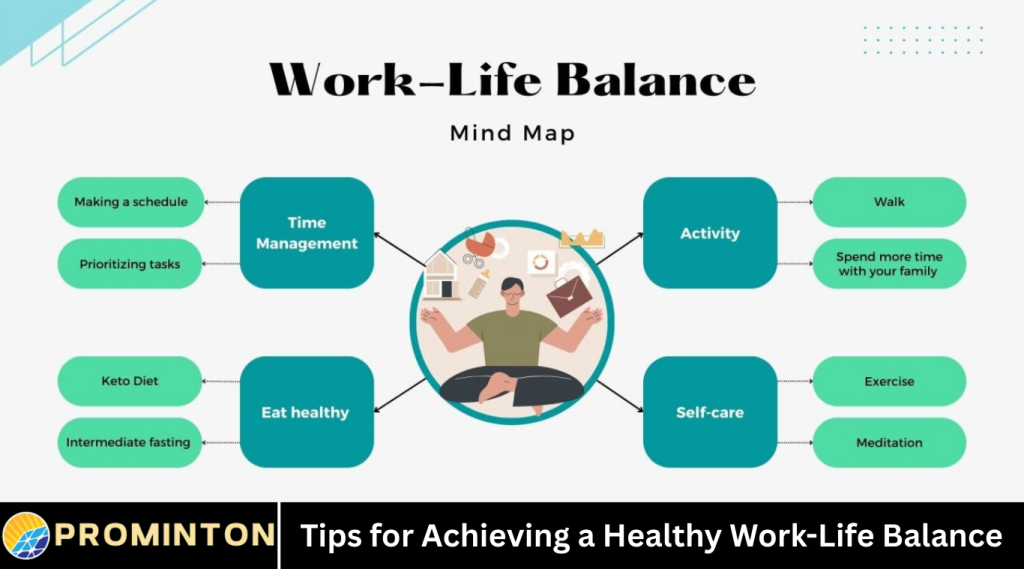In today’s fast-moving world, many people find it hard to balance work and life. Work can take up most of the day, leaving little time for family, friends, or relaxation. This imbalance can cause stress, tiredness, and unhappiness. A healthy work-life balance means dividing your time and energy so that work does not control your life.
It also means you have enough time for yourself and the people you care about. When you find this balance, you feel happier, healthier, and more energetic. This article shares useful tips to help you achieve a better balance between work and life.
Why Work-Life Balance Matters
Effects on Health
When work takes over life, it can cause stress, anxiety, poor sleep, and even health problems like high blood pressure. A balanced life helps you reduce stress, stay physically healthy, and keep your mind calm. You feel more energetic and ready to face challenges.
Impact on Relationships
Spending too much time working can harm your relationships with family and friends. When you balance your time, you can spend quality moments with loved ones, communicate better, and build stronger bonds.
Increased Productivity and Job Satisfaction
People who have good work-life balance tend to work better. They feel motivated and creative. When you are happy and rested, your work improves, and you enjoy your job more.
Tips to Achieve Work-Life Balance
Set Boundaries Between Work and Personal Life
Decide clear times for work and times for rest. Try not to check emails or work messages outside work hours. If you work from home, have a specific place for work so your mind knows when to focus and when to relax.
Plan Your Day
Make a daily plan that includes your work tasks and personal activities. Do the most important or urgent tasks first. Leave time for breaks and fun. Planning helps avoid feeling overwhelmed.
Learn to Say No
Sometimes, people ask you to do extra work or join social events when you don’t have time. Saying no politely is okay. Protect your time and energy by not overcommitting.
Use Technology Carefully
Phones and computers help in work but can also distract you. Turn off work notifications after office hours. Use apps that help you organize tasks, but avoid scrolling social media or checking work emails during rest time.
Take Regular Breaks
Short breaks during work help you stay focused and reduce tiredness. Even a few minutes of walking, stretching, or deep breathing can refresh you.
Exercise and Eat Healthy
Moving your body every day lowers stress and improves mood. It can be walking, yoga, or any physical activity you like. Eating balanced meals and drinking water keeps your energy high.
Get Enough Sleep
Good sleep helps you feel rested and alert. Aim to sleep seven to eight hours every night. Keep a regular bedtime and avoid screens before sleeping to relax better.
Make Time for Hobbies and Relaxation
Doing things you enjoy helps you relax and feel happy. Hobbies like reading, painting, gardening, or listening to music can reduce stress and refresh your mind.
Communicate Your Needs
Talk openly with your employer, coworkers, and family about your need for balance. When people understand your limits, they can support you better and avoid misunderstandings.
Avoid Trying to Be Perfect
Trying to do everything perfectly can make you stressed. Focus on doing your best and accept that some things will be good enough. This helps you feel less pressure and keeps balance.
Take Time Off When Needed
Don’t be afraid to take days off or vacations. Resting away from work refreshes your mind and body. Regular breaks improve your long-term happiness and productivity.
Build a Support Network
Surround yourself with friends, family, or colleagues who understand and support your goals. A support system helps you when things get hard.
Review and Adjust Your Balance Regularly
Life changes over time. Check how you feel and make changes to your routines to match your current needs and goals.
Frequently Asked Questions
What does work-life balance mean?
Work-life balance means managing your job and personal life so that neither overwhelms the other, helping you feel happy and healthy.
Why is work-life balance important?
It reduces stress, improves health, strengthens relationships, and increases job satisfaction and productivity.
How can I separate work and personal time when working from home?
Create a dedicated workspace, set specific work hours, and avoid checking work messages outside those hours.
What should I do if my work is too demanding?
Talk to your employer about your workload, prioritize your tasks, and say no to extra work when necessary.
How does exercise help with work-life balance?
Exercise reduces stress, boosts mood, and increases energy, helping you manage work and personal demands better.
What if I find it hard to say no to extra work?
Practice polite and honest communication. Explain your current commitments and the need to balance work and rest.
How can hobbies improve my work-life balance?
Hobbies give your mind a break, reduce stress, and increase happiness outside of work.
Conclusion
Finding a healthy work-life balance is not a one-time event; it is a continuous effort. By setting clear boundaries, organizing your day, caring for your health, and communicating clearly with those around you, you can create a peaceful and fulfilling life. Balance means doing what matters most to you and giving yourself permission to enjoy both your work and personal time. Start with small changes today and stay committed to your well-being for a happier tomorrow.



